

Myforexeye fintech Pvt Ltd
One of the significant aspects of money management forex is to balance two things- restricting worst case scenario losses to an acceptable level and maximise the potential profits. In order to get an adequate strategy for forex money management, it is important to apply risk management strategies that helps avoid risks involved in forex trading. Visit:
Buyers Credit Interest Rates with Importers & Foreign Bank. Initially let’s know about Buyers Credit.
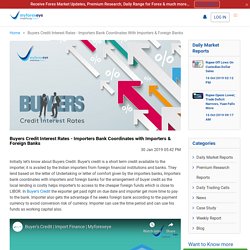
Buyer’s credit is a short term credit available to the importer; it is availed by the Indian importers from foreign financial institutions and banks. They lend based on the letter of Undertaking or letter of comfort given by the importers banks, Importers bank coordinates with importers and foreign banks for the arrangement of buyer credit as the local lending is costly helps importer’s to access to the cheaper foreign funds which is close to LIBOR. In Buyer’s Credit the exporter get paid right on due date and importer get more time to pay to the bank. Importer also gets the advantage if he seeks foreign bank according to the payment currency to avoid conversion risk of currency. Importer can use the time period and can use his funds as working capital also. London Interbank Offer Rate (LIBOR) is an interest rate at which one international bank lends other international bank for short term loans. Tips of Money Management Forex- Myforexeye. Managing forex money is important to increase profits and reduces losses which can arise if not monitored.
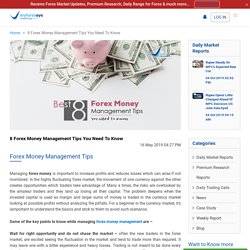
Benefits of Trade FInance Services for Exporter & Importers. The services related to trade finance offered by banks and financial institutions constitute the following.
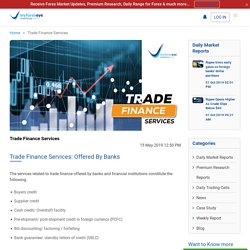
Buyers creditSupplier creditCash credit/ Overdraft facilityPre-shipment/ post-shipment credit in foreign currency (PCFC)Bill discounting/ factoring / forfeitingBank guarantee/ standby letters of credit (SBLC) Buyers credit: Short-term credit given to an importer (buyer) from overseas lenders such as banks and other financial institutions for goods it is importing. Overseas banks lend credit to the importer based on a letter of comfort (a bank guarantee) issued by the importer’s bank. Buyers credit helps local importers gain access to cheaper foreign funds that may be closer to the London Interbank Offer Rate (LIBOR) rates, as against local sources of funding which are more costly.
Forex Money Management Tips You Must Consider. Foreign exchange implies exchange of native currency with that of a currency of the other nation.

The foreign exchange market is not a complicated market and the entire working of trade is very similar to those of other financial markets so if you have any experience in trading, one should be able to pick it up pretty quickly. Currency trading successfully requires a lot of patience, a proper education, quick adaptation towards market updates and a number of other qualities. Buyers Credit Consultant at Myforexeye. Apply Letter of Credit. Pre-shipment Trade Finance- How is it Beneficial for Corporate.
All businesses require finance to support activities.
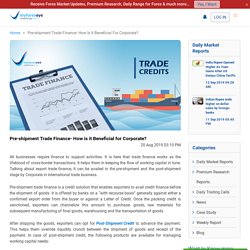
It is here that trade finance works as the lifeblood of cross-border transactions. It helps them in keeping the flow of working capital in tune. Talking about export trade finance, it can be availed in the pre-shipment and the post-shipment stage by Corporate in international trade business. Pre-shipment trade finance is a credit solution that enables exporters to avail credit finance before the shipment of goods. It is offered by banks on a “with recourse basis” generally against either a confirmed export order from the buyer or against a Letter of Credit. After shipping the goods, exporters can opt for Post-Shipment Credit to advance the payment. Invoice factoring or receivable discounting (by selling receivables document or invoice bills)Letter of Credit Bill Discounting orTrade loan via an accounts receivables document Pre-shipment packing credit can be extended in two forms:- 1) Packing Credit in Indian Rupee (PCINR).
How Prolonged Inflation Can Affect Foreign Exchange Rate? Inflation is not just one factor which causes volatility in foreign exchange rate, yet it is considered to be one of the major influencing factors.
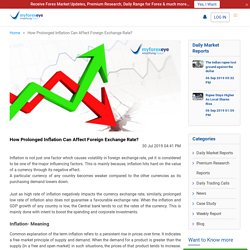
This is mainly because, inflation hits hard on the value of a currency through its negative effect.A particular currency of any country becomes weaker compared to the other currencies as its purchasing demand lowers down. Just as high rate of inflation negatively impacts the currency exchange rate, similarly, prolonged low rate of inflation also does not guarantee a favourable exchange rate. How Export & Import Finance is Going To Change Your Business Strategies. Export & Import Finance Across the world, the cross –border trade (import and export) is rapidly growing and in a world that is increasingly connected.
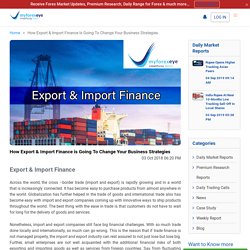
It has become easy to purchase products from almost anywhere in the world. Globalization has further helped in the trade of goods and international trade also has become easy with import and export companies coming up with innovative ways to ship products throughout the world. The best thing with the ease in trade is that customers do not have to wait for long for the delivery of goods and services. Nonetheless, import and export companies still face big financial challenges. Export and Import Finance is a finance method that fulfills the funding gap between receiving goods and sending payments for importers and exporters. Advance payments terms are risk for the buyer since there is no guarantee that seller will send the product of good quality and on time. Export and import financing offers a way to mitigate these financial risks. 1.
What is Bill Discounting? Bill Discounting is a method of trading the bill of exchange to the financial institution before it gets matured, at a price that is in a smaller amount than its par value.
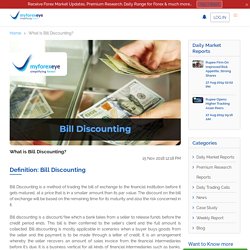
The discount on the bill of exchange will be based on the remaining time for its maturity and also the risk concerned in it. Bill discounting is a discount/fee which a bank takes from a seller to release funds before the credit period ends. Swelling Foreign Exchange Reserves Can Help India’s Economy Grow. For any country, maintaining forex reserves is essential as it helps in maintaining the economic wellbeing of any nation.
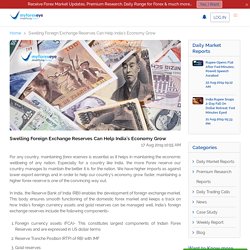
Especially for a country like India, the more Forex reserve our country manages to maintain the better it is for the nation. We have higher imports as against lower export earnings and in order to help our country’s economy grow faster, maintaining a higher forex reserve is one of the convincing way out. In India, the Reserve Bank of India (RBI) enables the development of foreign exchange market. This body ensures smooth functioning of the domestic forex market and keeps a track on how India’s foreign currency assets and gold reserves can be managed well. India’s foreign exchange reserves include the following components- Foreign currency assets (FCA)- This constitutes largest components of Indian Forex Reserves and are expressed in US dollar termsReserve Tranche Position (RTP) of RBI with IMFGold reservesSpecial Drawing Rights (SDRs)
Currency Options & Futures: Key Differences & Advantages. Currency hedging is an integral part of Forex Exchange and Risk Management.
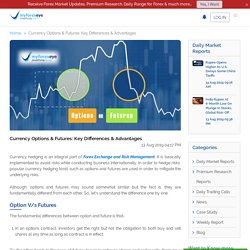
It is basically implemented to avoid risks while conducting business internationally. In order to hedge risks, popular currency hedging tools such as options and futures are used in order to mitigate the underlying risks. Although, options and futures may sound somewhat similar but the fact is, they are fundamentally different from each other.
So, let’s understand the difference one by one. The fundamental differences between option and future is that- In an options contract, investors get the right but not the obligation to both buy and sell shares at any time as long as contract is in effect.